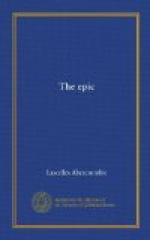The prime material of the epic poet, then, must be real and not invented. But when the story of the poem is safely concerned with some reality, he can, of course, graft on this as much appropriate invention as he pleases; it will be one of his ways of elaborating his main, unifying purpose—and to call it “unifying” is to assume that, however brilliant his surrounding invention may be, the purpose will always be firmly implicit in the central subject. Some of the early epics manage to do without any conspicuous added invention designed to extend what the main subject intends; but such nobly simple, forthright narrative as Beowulf and the Song of Roland would not do for a purpose slightly more subtle than what the makers of these ringing poems had in mind. The reality of the central subject is, of course, to be understood broadly. It means that the story must be founded deep in the general experience of men. A decisive campaign is not, for the epic poet, any more real than a legend full of human truth. All that the name of Caesar suggests is extremely important for mankind; so is all that the name of Satan suggests: Satan, in this sense, is as real as Caesar. And, as far as reality is concerned, there is nothing to choose between the Christians taking Jerusalem and the Greeks taking Troy; nor between Odysseus sailing into fairyland and Vasco da Gama sailing round the world. It is certainly possible that a poet might devise a story of such a kind that we could easily take it as something which might have been a real human experience. But that is not enough for the epic poet. He needs something which everyone knows about, something which indisputably, and admittedly, has been a human experience; and even Grendel, the fiend of the marshes, was, we can clearly see, for the poet of Beowulf a figure profoundly and generally accepted as not only true but real; what, indeed, can be more real for poetry than a devouring fiend which lives in pestilent fens? And the reason why epic poetry so imperiously demands reality of subject is clear; it is because such poetry has symbolically to re-create the actual




